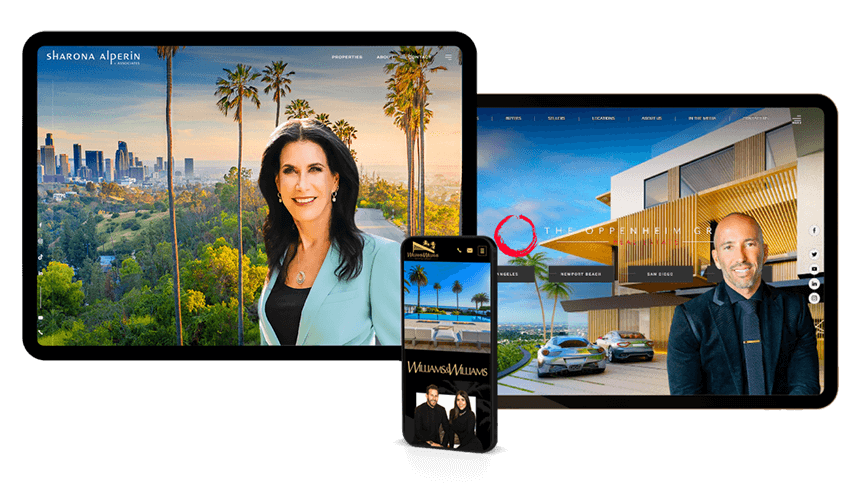SEO vs. SEM: Which is Better For Real Estate Lead Generation?
Generating Real Estate Leads:
Paid vs. Organic
We’ve talked about whether Facebook or Google ads are better at generating real estate leads. Now, it’s time to talk about whether search engine optimization (SEO) or search engine marketing (SEM) offers better results.
Unlike the previous discussion, though, this isn’t exactly an apples-to-apples comparison, since SEO generates organic traffic while SEM deals with paid traffic. Nevertheless, they can both be classified as “pull marketing” since they “pull in” people further down the sales funnel – that is, real estate prospects who already know what they want and are actively searching for it online.
When it comes to lead generation for agents, which strategy offers the best results? And how can you integrate each effectively into your marketing mix? Let’s find out!
Is SEO or SEM better for lead generation?

What is real estate website SEO?
SEO is all about improving the quantity and quality of organic traffic to your real estate agent website. The goal is to make your website rank as highly as possible on search engine results pages (SERPs) because there is a strong correlation between search ranking and clickthrough (the top three results garner over 54% of all clicks). It entails:
-
On-page SEO
Optimizing individual web pages to rank higher and earn more relevant traffic. This includes keyword optimization, meta tags, and content quality. -
Off-page SEO
Actions taken outside your own website to impact your rankings. This primarily involves building high-quality backlinks from other websites. -
Technical SEO
Ensuring your website meets the technical requirements of modern search engines. This includes site speed, mobile-friendliness, and indexing.
What is real estate SEM?
Meanwhile, SEM describes advertising strategies designed to boost your search engine visibility. Since paid search ads tend to appear at the top of SERPs, they get better exposure, which might ultimately translate into more real estate leads.
The most common form of SEM in real estate is pay-per-click (PPC) advertising. Here, you bid on specific keywords related to your niche (e.g., "waterfront property realtor"). When someone searches for those terms, Google serves your ad – typically ahead of organic or non-paid results. PPC formats include:
-
Search Network Ads
These text-based ads appear on SERPs when users enter relevant keywords. -
Display Network Ads
These visually driven ads pair images/videos with text and appear on the vast Google Display Network. -
Video Ads
These are the pre-roll or mid-stream video ads you see on YouTube. -
Local Services Ads
Agents apply to be Google Verified, after which their ads are given priority in local service queries (especially suited for agents).

What are the pros and cons of SEO?
-
Pros of SEO
-
Cost-effective
Once the groundwork is laid, it only needs occasional refreshing (e.g. meta titles & descriptions). -
Builds credibility
Organic ranking is a signifier of authoritativeness. -
Sustainable
Ongoing costs aren’t as high since this isn’t advertising (not pay-to-play).
-
-
Cons of SEO
-
Results aren’t immediate
It can take months to see the effects of SEO. -
Requires ongoing effort
SEO is driven by quality content, which means you have to regularly produce market reports, blogs, e-books, etc. -
Affected by algorithm changes
Google updates can have an impact on your current ranking.
-

What are the pros and cons of SEM?
-
Pros of SEM
-
Faster lead generation for agents
Since you pay for visibility, results for SEM campaigns are also more immediate. -
Highly targeted
You can segment the audience you show your ads to, increasing the likelihood of click-throughs. -
Measurable results
Analytics allows you to see exactly how your campaign performs so you can tweak your strategy to optimize results.
-
-
Cons of SEM
-
Ongoing costs
Though cost-effective, SEM campaigns still require a sizable marketing investment. That’s because you’re bidding against others for the same keywords, which drives up costs. -
Traffic ends when spending ends
Again, SEM is a pay-to-play strategy. When your budget is used up, your ads stop displaying. -
Ad blindness
People may develop so-called “ad blindness,” wherein they automatically ignore anything that looks ad-like on SERPs.
-
Fine-tuning your SEO & SEM strategy
Combining both SEO and SEM often leads to the best lead generation for real estate agents. That said, your specific mix will differ depending on your resources and business goals. Below are a couple of factors to guide your decision-making:
-
Budget
If your budget is limited, you may want to focus on SEO as a long-term strategy supplemented by a smaller SEM campaign. If you want to make an immediate impact and you have the budget, SEM will be a huge help. -
Timeframe
SEO is a long game – after all, it takes some time for Google’s search spider to index your website, so don’t expect immediate results. That said, it will build your credibility and authority as time goes on (provided you continually publish quality content and adhere to SEO best practices). On the flip side, if you must get results ASAP, then SEM is the way to go. It will prove very helpful if, for example, you need to generate leads for a newly announced real estate development quickly. -
Market landscape
Do you work in a highly competitive real estate market? You can cut through with highly targeted search ads. However, prospects also consider the reputation y of an agent before signing with them; SEO plays an important role in establishing your expertise and trustworthiness. -
Target audience
You also need to ask which lead you’re trying to attract. If it’s people who are still considering buying a home, providing helpful information like buyer’s guides, neighborhood profiles, and market reports will make them more likely to hire you (SEO). On the other hand, if you want to target people who are already keen on buying a home in your market, you may want to run search ads for your listings page or even specific house listings (SEM).
Frequently Asked Questions
SEO is a long-term game, but it lays a strong foundation for attracting organic traffic over time. Even with a new website, you can start implementing SEO best practices to improve local search ranking for your city or neighborhood.
Focus on informative content valuable to potential buyers and sellers. This could include local market updates, blog posts on the home buying/selling process, neighborhood guides, and home staging best practices.
There's no one-size-fits-all answer. PPC costs depend on your location, target keywords, and competitiveness. However, you can start with a smaller budget and adjust based on campaign performance and return on investment (ROI).
It's possible, but it requires ongoing effort and staying updated on the latest digital marketing trends. Consider consulting with a real estate marketing specialist to create a comprehensive strategy and manage your campaigns for optimal results.
Google recently launched SGE, which provides helpful summaries that answer users’ queries. SGE might affect SEO by reducing click-through rates on organic results if users find answers within the SGE summaries. However, your high-quality content could be referenced by SGE and your website could be cited as a source, boosting its visibility. The impact of SGE on PPC ad placement is still uncertain. While SGE summaries might push some ads down the search results page, it's unlikely to eliminate them entirely. A study explores the potential effect of SGE on search ad visibility.
What’s your SEO & SEM mix?
Now that you have a better understanding of both, we hope that you can implement them effectively to generate more leads than ever. As always, Agent Image is here to help you navigate the fast-changing landscape of search visibility. If you need help with SEO or SEM, tap our team of experienced digital marketers!




